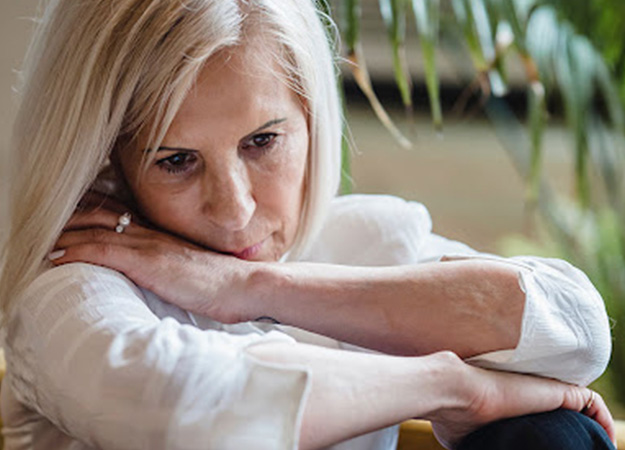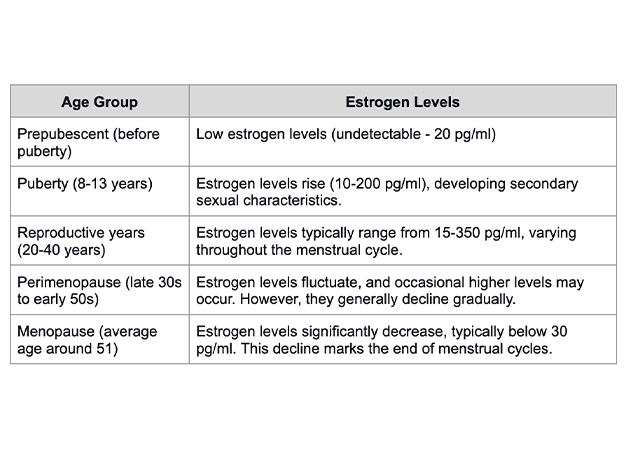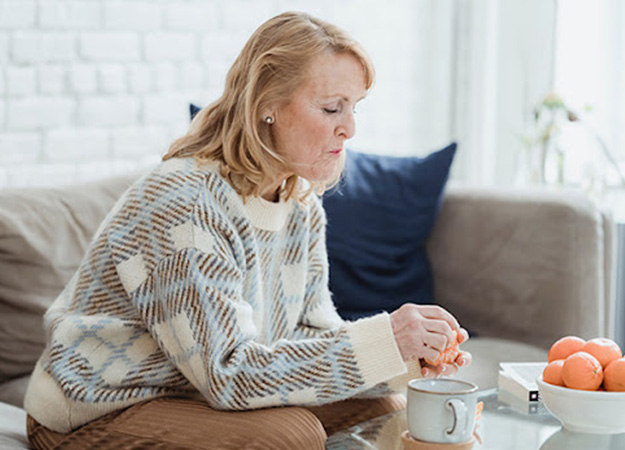Although menopause is the time in a woman’s life that should be embraced rather than worried about, it’s hard to get used to those troubles due to symptoms of low estrogen: hot flashes, night sweats, and mood changes, among others.
Is there a way to end the distress and lead a better life?
Understanding the hormonal changes at 40 symptoms is essential to help women manage menopause and overall health during this transition.
Low Estrogen Symptoms: Causes | Identification | Treatment

What Does Estrogen Do for Women?
Estrogen, often called the “fountain of youth” in females, is crucial in various physiological processes. Primarily produced in the ovaries, this hormone regulates the female reproductive system and influences various aspects of a woman’s health.
Estrogen contributes to developing secondary sexual characteristics during puberty, such as breast growth and widening hips. It also plays a pivotal role in the menstrual cycle, regulating the growth and shedding of the uterine lining.
Beyond reproduction, estrogen impacts bone health by aiding calcium absorption and maintaining bone density. Also, estrogen’s multifaceted roles include maintaining healthy cholesterol levels and promoting cardiovascular health.
Finally, estrogen maintains vaginal lubrication and elasticity, thus crucial in sexual function.
How Do Estrogen Levels Change by Age?
As women age, estrogen levels gradually decline. This decline is most notable during menopause, when estrogen levels plummet rapidly, leading to symptoms such as hot flashes, mood swings, and vaginal dryness.
The table below depicts the general trend of estrogen levels across different age groups:

How Do Estrogen Levels Change by Age?
Menopause
During menopause, estrogen levels decline as a natural part of the aging process. As a result, the ovaries gradually produce less estrogen, resulting in irregular menstrual cycles and, eventually, the cessation of menstruation.
On average, menopause occurs around age 51, but the timing can vary. By age 50, women may have only 10-30% of the estrogen levels they had in their 20s.

Stress
According to a study, “psychological stress may aggravate natural falls in estrogen during the menstrual cycle and reduce peak levels.”
It has been demonstrated that stressful events, such as those encountered at work, before competitions, or during examinations, cause hormone levels to drop. A similar result was observed in those facing job loss and workplace reorganization.
Conversely, hormone levels were shown to rise when the workplace situation improved.
Lack of Nutrition
-
Nutrient-deficient diet:
Inadequate intake of essential nutrients like healthy fats, proteins, and micronutrients (vitamins and minerals) can impact estrogen production
-
Severe calorie restriction or eating disorders:
Extreme calorie restriction, such as in cases of anorexia nervosa or excessive exercise, can disrupt normal hormonal function and lead to symptoms of low estrogen
-
Vegetarian or vegan diets:
While obtaining sufficient nutrients on these diets is possible, certain nutrients like vitamin B12, iron, and omega-3 fatty acids may be more challenging to obtain, potentially affecting hormonal balance
Treatments Impacting the Ovaries
-
Ovarian surgeries or removal:
Surgical procedures such as oophorectomy (removal of ovaries) or ovarian radiation therapy can result in a sudden drop in estrogen levels, leading to symptoms of low estrogen
-
Chemotherapy or hormone therapy:
Cancer treatments, including chemotherapy and hormone therapy for breast cancer, can affect ovarian function and suppress estrogen production, resulting in low estrogen symptoms
Certain Diseases Or Inherited Disorders
-
Primary ovarian insufficiency (POI):
A condition where the ovaries stop functioning before age 40, leading to reduced estrogen production and menstrual irregularities
-
Turner syndrome:
A genetic condition where one of the X chromosomes is missing or partially missing, causing ovarian dysfunction and symptoms of low estrogen
-
Hypothalamic amenorrhea:
Excessive physical or emotional stress, excessive exercise, or significant weight loss can disrupt the hypothalamic-pituitary-ovarian axis, leading to a decrease in estrogen production
10 Symptoms of Low Estrogen in Women
-
Dry Skin:
Decreased estrogen levels can contribute to dry and less elastic skin, leading to a lack of moisture and increased skin sensitivity
-
Weight Gain:
Hormonal changes during low estrogen levels can affect metabolism and lead to weight gain, particularly around the abdomen and hips
-
Mood Swings:
Fluctuating estrogen levels can impact neurotransmitters, causing mood swings, irritability, and increased emotional sensitivity
-
Hot Flashes and Night Sweats:
Sudden feelings of intense heat, accompanied by excessive sweating, are common symptoms of low estrogen levels, often experienced during menopause
-
Irregular or Absent Periods:
Low estrogen levels can disrupt the menstrual cycle, leading to irregular or missed periods as the body adjusts to hormonal changes
-
Fatigue and Sleep Difficulty:
Decreased estrogen can affect sleep patterns, leading to insomnia, difficulty falling asleep, or disrupted sleep, resulting in daytime fatigue
-
Trouble Concentrating:
Changes in hormone levels can impact cognitive function, causing difficulty concentrating, memory lapses, and decreased mental clarity
-
Headaches Before the Menstrual Period:
Low estrogen levels can trigger hormonal headaches, often occurring in the days leading up to menstruation
-
Vaginal Dryness or Atrophy:
Reduced estrogen can lead to decreased vaginal lubrication and thinning of the vaginal walls
-
Low Sex Drive and Painful Intercourse:
Low estrogen levels can decrease libido and cause discomfort during intercourse due to vaginal dryness and thinning tissues

How to Increase Estrogen in Women?
Adopting a balanced and nutrient-rich diet is crucial to increase estrogen levels naturally. Include foods rich in phytoestrogens, which are plant-based compounds that mimic estrogen in the body. Foods that can help boost estrogen levels include:
- Soy products (soybeans, tofu, tempeh, soy milk)
- Flaxseeds and flaxseed oil
- Sesame seeds and sesame oil
- Chickpeas and other legumes (lentils, black beans, kidney beans)
- Berries (strawberries, raspberries, blueberries)
- Nuts (almonds, walnuts, pistachios)
- Whole grains (oats, barley, quinoa)
- Cruciferous vegetables (broccoli, cauliflower, cabbage, kale)
- Citrus fruits (oranges, grapefruits, lemons)
- Dried fruits (dates, apricots)
Lifestyle Modification
Lifestyle plays a role in supporting optimal estrogen levels in women. Therefore, maintaining a healthy body weight is essential, as excess fat can affect estrogen production.
Regular exercises, such as aerobic activities and strength training, can also help regulate hormone levels and promote estrogen synthesis.
Managing stress through techniques like mindfulness, meditation, and relaxation exercises is crucial, as chronic stress can disrupt hormone balance. In addition, adequate sleep and limited alcohol intake can also contribute to healthy estrogen levels.
Hormone Replacement Therapy
Hormone replacement therapy (HRT), often called “estrogen supplements,” can address low estrogen levels due to menopause and alleviate the signs associated with it.
By providing exogenous estrogen that resembles the hormone’s natural functions, HRT restores hormonal balance and reduces the symptoms of low estrogen.
Whether it’s hot flashes, night sweats, vaginal dryness, or mood swings, HRT offers a promising solution. Imagine regaining your vitality, experiencing relief from discomfort, and reclaiming a sense of well-being. You can reverse your biological clock!
With the guidance of a healthcare professional, HRT can be tailored to suit your individual needs, helping you rediscover a life free from the limitations imposed by low estrogen.
Yunique Medical provides FUNCTIONAL MEDICINE for optimized health and performance. We offer customized, scientifically advanced treatments to create a new state of human thriving. Why be ordinary when you can be optimal?
HUMAN 2.0 begins here!
Contact us to schedule your FREE consultation at one of our three locations in Florida – Ocala, Fruitland Park (The Villages), and Daytona.
UP NEXT:
- Signs And Symptoms Of Estrogen Dominance
- Early Menopause Linked To Increased Risk Of Presenile Dementia
- How Long Does Perimenopause Last? Signs That It’s Ending

